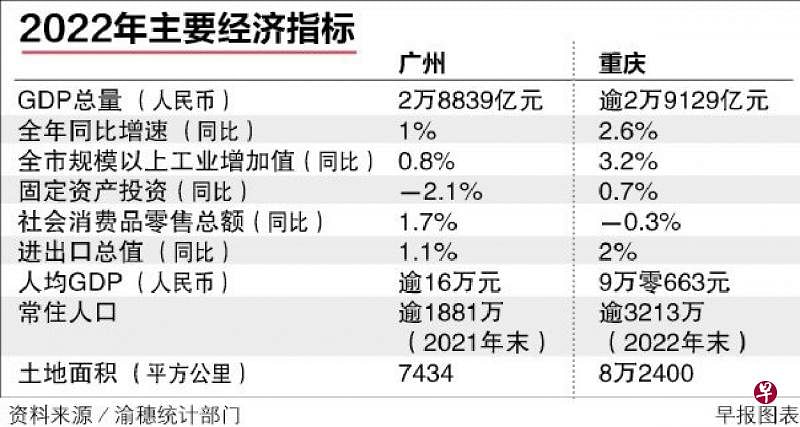
Special
Scholars of Yugui pointed out that Chongqing has narrowed the gap with Guangzhou in terms of industrialization and opening up, and has a post -economic post -development advantage. It is expected that GDP will continue to exceed the next few years.opponent.
After more than 30 years, Chongqing's annual economic growth exceeded Guangzhou, and eventually won in the latest round of the fourth city of China's economy.Although it was subject to epidemic, drought and electricity limit in the second half of the year, "Shancheng" last year's regional GDP (GDP) last year was not only more than 29 billion yuan higher than "Yangcheng" (RMB, Same as S $ 5.67 billion).The year -on -year increase was also 1.6 percentage points higher.
Scholars of Yusui pointed out that Chongqing has a narrowing gap with Guangzhou in terms of industrialization and opening up, and has a post -economic post -development advantage. It is expected that GDP will continue to overtake opponents in the next few years.Scholars also expect that the pattern of traditional Chinese first -tier cities in "North, Shanghai, Guangzhou and Shenzhen" has already entered history, and the replacement of "Beijing, Shanghai, Shanghai, Shenzhen, Chongqing)" will become normal.
Since the beginning of the year, major cities in China have announced the 2022 economic transcripts. The latest China's top 10 cities in China are released this month. The top three are still the two in Shanghai and Beijing.First -tier cities, and GDP exceeded 3 trillion yuan in Shenzhen for the second consecutive year.
Guangzhou ranked fourth and GDP leading 33.8 billion yuan in Chongqing. Last year, it was overtaken by Chongqing and fell to fifth.
According to data from the statistical departments of the two places in Chongqing, Chongqing last year's GDP was more than 2912.9 billion yuan, an increase of 2.6 % over the same period last year, and only 0.4 percentage points behind the national growth rate.In the same period, Guangzhou's GDP was 288.9 billion yuan, an increase of 1.0 % year -on -year, and both economic indicators were behind Chongqing.
 />
/>
The epidemic is the key impact of the economic "tug -of -war" in Chongqing in the second half of the year of Guangzhou
Chongqing, as an old -fashioned industrial city in the West, was the third city of China GDP in 1990, but was surpassed by Guangzhou the next year; in 2003, it was squeezed into seventh place by Tianjin and Suzhou. It was the lowest ranking since reform and opening up.Only the year became the fifth city of China GDP.
After the outbreak of the crown disease, the GDP in Chongqing in the first half of 2020 was nearly 24.2 billion yuan higher than Guangzhou, but failed to win Guangzhou throughout the year.After two years, Chongqing led Guangzhou again with 7.8 billion yuan in the first half of last year. The year -on -year growth rate was 3 percentage points higher."Guang" has occupied the top four GDP in China since 1999.
Qiu Dongyang, dean of the School of Economics and Finance of Chongqing University of Technology, pointed out in an interview with Lianhe Morning Post that the epidemic was the most critical factor in the total economic "tug -of -war" of Yusui last year.The impact lasted for a whole year.
Peng Peng, executive chairman of the Guangdong Provincial System Reform Research Association, pointed out in an interview that last year, the China Import and Export Commodity Fair (Canton Fair) affected exports due to the suspension of the Guangzhou epidemic and in recent years.Promote Chongqing's final year GDP surpass Guangzhou.
Scholars: Chongqing optimizing the industrial structure reflects the geographical wide advantage
Peng Peng also pointed out that Chongqing's economy has the advantages of post -development, as well as "decisive factors" such as population and area size. "The growth rate is higher than Guangzhou, and it is sooner or later.As one of the four municipalities in China, Chongqing has 11 times the area of Guangzhou and 1.7 times the permanent population.
Qiu Dongyang believes that the population and land area are not economic leading decisive factor. The Japanese economy has led China for many years. At present, Chongqing's overall development is still slightly behind Guangzhou.
But he pointed out that Chongqing has a gap with Guangzhou in terms of industrial foundation, modernization, urbanization, talent, and opening up. In recent yearsThe geographical wide advantage is reflected.
Qiu Dongyang also pointed out that the development of the main urban areas in the two places is relatively saturated, but Chongqing has not fully developed in 18 cities and towns in the northeast and southeast, and the Shuangcheng Economic Circle in Chengdu and Chongqing.There are also "great stamina", and the depth and toughness of the economy will also be more effective.Chongqing's current urbanization rate is about 71 %, and there is still a significant distance from about 87 % of Guangzhou.
The economic growth indicator is adjusted to 6 % Chongqing or ranked among the first -tier cities
After the prevention and control of China's epidemic is almost completely loosened, Ya Sui released a strong signal of full efforts to fight for the economy, adding suspense to the "battle" of the fourth city of China's economy this year.
Under the slogan of building a "New Chongqing", the Secretary of the Chongqing Municipal Party Committee of the Communist Party of China, the mayor Hu Henghua announced the latest government work report on January 13, and announced that the hard indicator of Chongqing's economic growth rate this year was more than 6 %. By 2027In the year (that is, the 30th anniversary of Chongqing), GDP and per capita GDP have been trapped in 4 trillion yuan and 120,000 yuan, respectively, which means that it will be ranked among first -tier cities.
As the largest GDP province in China, Guangdong held a high -standard mobilization conference on the theme of "High -quality Development" on the theme of "High -quality Development" (January 28).Lin Keqing, secretary of the Guangzhou Municipal Party Committee of the Communist Party of China, established a "military order" at the meeting and announced that the Guangzhou GDP this year will exceed 3 trillion yuan, an increase of more than 6 %.
Peng Peng analyzes that the biggest advantage of Guangzhou's economy is "one step first", the market economy has better development, the market competitiveness is fully competitive, the market rules can play a role, and the industrial structure also has certain advantages.
But he pointed out that the shortcomings of the Guangzhou economy lies in the large scale of emerging industries, insufficient leading enterprises, and not strong private enterprises.Insufficient mental, the reform measures are not strong, and the shortcomings have increased the shortcomings. "
Peng Peng analyzed that if Guangzhou wants to retake the position of China's GDP fourth city, it must have a big breakthrough in the overall upgrade of the industry, including "emerging industries explosive development, more world Fortune 500 companies", but "At present, it is very difficult. "
According to the evaluation of Qiu Dongyang, Chongqing's current obvious advantage is that it continues to drive economic development with a large amount of investment. By improving the flow of transportation and elements through the construction of infrastructure, more national policies have been landed.
He pointed out that Chongqing currently combines the two national strategies of the Chengdu -Chongqing Economic Circle and the Western Land and Sea New Channel as a specific starting point for promoting the "dual -cycle" strategy.One of the "highlights" of development.
But Qiu Dongyang also pointed out that after several years of exploration in Chongqing, the economic vitality is still insufficient, and sustainable development has not been formed in the local area.Ecology must strengthen the business environment and attract scientific and technological talents.Last year, Chongqing's per capita GDP reached 90,663 yuan. Compared with Guangzhou with more than 160,000 yuan, there was still a big gap in economic quality.



